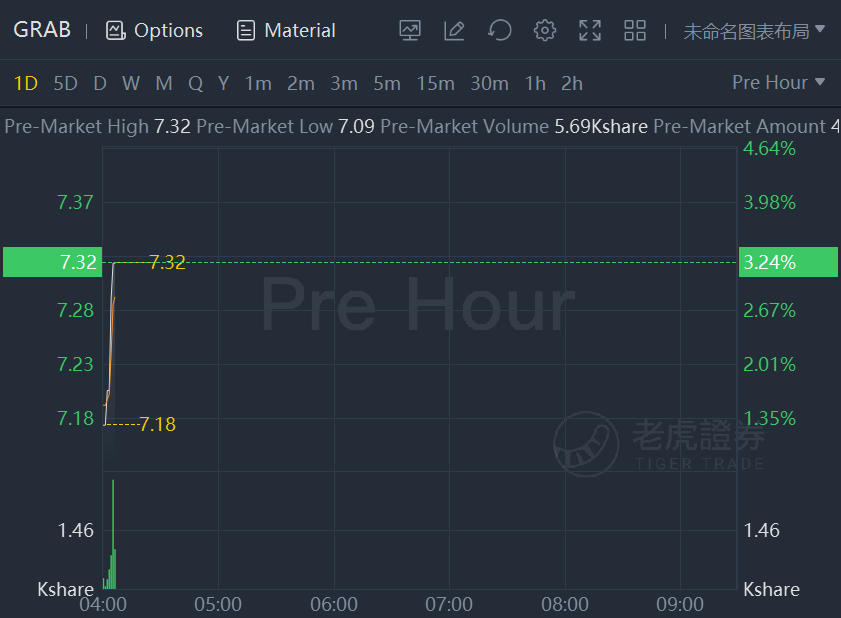Grab stock climbed more than 3% in premarket trading Tuesday after falling more than 3% yesterday.
Grab debuted on the Nasdaq following a deal with blank-check company Altimeter Growth Corp., which valued the company at nearly $40 billion. It became the largest-ever company to close a SPAC merger and go public.
But shares fell more than 20% from $13.06 to $8.75 a piece in the first day of trading. Since then, the stock has fallen another 16%.
Still, JPMorgan likes the stock and said the company has a “superior regional superapp” and multiple opportunities for “multi-year growth.” The investment bank said that Grab’s regional leadership in Southeast Asia is driven by a highly scalable and localized platform that is underpinned by its proprietary technology.
“The platform enables Grab to offer its services at a structurally lower cost base vs peers, with higher retention rates,” JPMorgan analysts wrote in their initiation coverage note earlier this month. “Grab’s platform gives it further advantages over its peers with limited geographical presence and/or fewer services, as Grab can allocate cash flows across countries and services to deliver on growth.”
Here are JPMorgan, Citi and Evercore’s ratings and price targets for Grab, and why they like the stock:
JPMorgan
JPMorgan initiated coverage on Grab with an overweight rating and a price target of $12.50 over the next 12 months — that represents over 70% upside from the Dec. 23 closing price of $7.35.
Based on the investment bank’s rating system, an overweight rating implies JPMorgan expects Grab’s stock to outperform over the next six to 12 months.
The analysts said Grab’s superior regional app, comprising multiple services including ride-hailing and food delivery, is “best geared to rising online consumption” in Southeast Asia. They said they identified gross merchandize value and revenue growth as key catalysts for the company and they see “multiple opportunities for multi-year growth.”
GMV is a metric often used in e-commerce to measure the total dollar value of goods sold over a certain period of time.
The investment bank said Grab is a leader in ride-hailing across the region and that could lead to a highly profitable mobility business, where lifting Covid restrictions and broader economic reopening could drive growth.
While the company’s delivery business is at an earlier stage of development, JPMorgan said there’s growth potential due to the relatively fragmented, but large total addressable market for food delivery and groceries. But the bank said that Grab is likely to see losses in the near-to-mid term due to investments and competition for market share.
The analysts warned, however, that Grab’s stock price could be volatile over the next six months as the free float expands due to staggered expiration of lock-ups that will release additional shares. Potential inclusion in MSCI indexes could also contribute to the volatility, JPMorgan said.
Citi
Citi initiated coverage of Grab with a buy rating and a price target of $12 a share, but also flagged the stock as high risk.
Compared with regional peers, Citi analysts said Grab benefits from its ability to capture larger volumes of consumer data given higher frequency of delivery and mobility demand compared to services like e-commerce. That gives the company an easier way to cross-sell its financial services products, they added.
The analysts pointed out that Grab has a “broader geographic footprint with more equal strength in the ... Southeast Asia countries in which it operates,” compared with Indonesian rival GoTo Group.
Citi said, however, spending per transaction and per user is lower for Grab than other regional players like Sea, which operates e-commerce platform Shopee. That implies Grab would face more headwinds if Covid cases in the region surge again, forcing countries to impose lockdowns and other mobility restrictions.
“Grab also lacks a high-margin gaming business and global exposure given its Southeast Asia focus,” Citi analysts said.
Evercore
Evercore initiated coverage with an outperform rating and a price target of $10.
The firm said Grab will likely face more local competition in each market for its delivery business compared to ridesharing, where the only other international incumbent is GoTo Group’s Gojek — particularly, in Indonesia.
“Within its Delivery segment, Grab faces a bit more competition across its core geographies,” Evercore analysts said in a recent note. They flagged the likes of Foodpanda, Gojek and Deliveroo in Singapore, LineMan in Thailand as well as Now and Baemin in Vietnam as competitors.
“Lastly, Grab competes with last-mile logistics providers such as Gojek and Lalamove, and more local last-mile players such as AhaMove (Vietnam),” the analysts said.
In the financial services business, Grab faces competition from traditional players including credit card companies, banks as well as cash, which is still the predominant mode of payment in Southeast Asia.
Still, the Evercore analysts said that most of Grab’s core business segments including delivery, mobility and financial services remain underpenetrated, which grants the Singapore-headquartered company “a probable long runway for growth.”

精彩评论